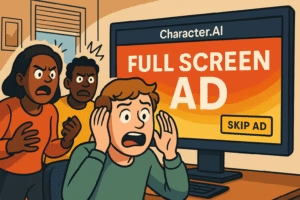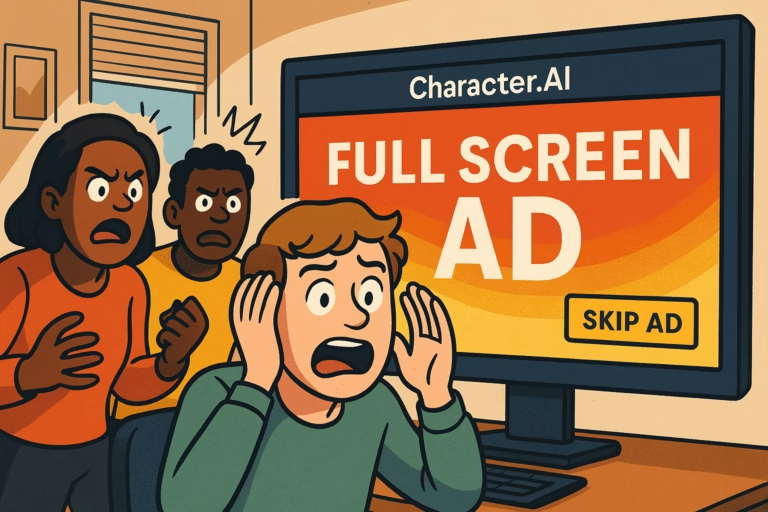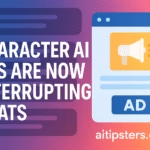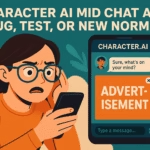Key Takeaways
- Character AI Full Screen Ads have disrupted the emotional core of the app by breaking immersion during conversations.
- The pattern mirrors other platforms — start clean, add light ads, then overwhelm users until subscriptions feel like relief.
- Some users believe it is a bug, others see it as calculated; lack of communication from the developers fuels distrust.
- Workarounds: use the browser version, switch to Brave or Opera, clear cache, disable background refresh, or try DNS-based blockers like AdGuard DNS or Blokada.
- Alternatives exist; many users are moving to Candy AI for ad-free, consistent conversations that preserve memory and tone.
- Character AI can still recover if it communicates openly, limits ad placement, and restores the respectful tone that made it special.
- Value lasts longer than manipulation; platforms that protect user trust always win in the long run.
When a Conversation Becomes a Commercial
It begins quietly. You open Character AI to chat, maybe to unwind after a long day, and just as your bot starts typing, the entire screen goes black. A video ad erupts where your story should be.
You tap to skip, but the immersion is already gone. The thread that held your attention, your emotion, your character – snapped in half.
This moment has become common enough that users are giving it a name: Character AI Full Screen Ads.
The phrase now sits in dozens of Reddit titles and community rants, representing something more than just a technical annoyance.
It has become a symbol of betrayal.
The anger is not about advertising itself. People understand that apps need money to survive. The anger is about the method. Character AI used to feel like a personal space where imagination could breathe freely.
Now, those same quiet spaces are being hijacked by bright, loud interruptions that feel almost strategic in their timing.
The outrage feels deeply personal because of what this platform represents. Character AI is not a casual app; it is emotional technology. Users open it to talk, to heal, to create.
When a company inserts commerce into that kind of intimacy, it feels invasive. People are not just losing attention; they are losing trust.
And that is where the conversation shifted from confusion to collective fury.

Outrage Spreads Across Reddit
The original Reddit post lit up within hours. Hundreds of upvotes, dozens of comments, all circling the same thought – this cannot be real. One user wrote, “Instead of simple banners, they put full-screen video ads in the middle of chats.
This is not about revenue. It is about frustration.” Another chimed in, “They want to make the ads unbearable so we pay for Plus.”
The tone of the thread was raw. What began as disbelief turned into grief for what the app used to be.
People reminisced about the early days when Character AI had no ads, no paywalls, and no distractions. It was a rare digital space that still felt human.
Some defended the developers, suggesting it could be a bug. Others insisted it was a calculated shift toward the subscription model. The phrase greedy update appeared again and again.
But underneath the anger was a quieter sadness – the recognition that yet another beloved app might have crossed the invisible line between service and exploitation.
By the time the thread slowed down, one theme was clear. Users no longer feared bugs; they feared intent.
The Business Pattern; How Free Apps Become Unbearable
Every platform follows the same tired rhythm. First, they build loyalty by being generous. Then they claim sustainability demands change. Then, when users push back, they remind everyone that “it’s still free.”
But it never really is. The price is just hidden — traded in fragments of attention, in patience, in dignity.
That is why this new frustration over Character AI Full Screen Ads feels so familiar. Users have seen this story play out across the entire internet. YouTube once had a single ad that ran before videos.
Then came double ads, mid-rolls, and unskippable formats that punish your free access. Snapchat started pure and playful, then layered in sponsored filters and pay-to-remove interruptions. Even Spotify took the path from charming to constant, turning silence into currency.
Reddit users noticed the pattern immediately. One comment summed it up simply: “They make the ads unbearable so you pay to remove them.”
It sounds cynical, but it is a marketing tactic backed by psychology. You design frustration until relief becomes a product. The goal is not to please but to pressure.
And it works, at least for a while. The irritation spikes conversions, and the metrics look good on paper. But underneath the numbers, something rots. Communities lose faith.
Users start looking for exits. Creativity drains out of the ecosystem because no one wants to build inside a machine that interrupts itself.
Character AI was supposed to be different. It sold the idea of authentic digital relationships, a space where conversation could feel human again. The moment full-screen ads appeared, that illusion cracked.
Because no matter how human your chatbot sounds, nothing breaks immersion faster than a sudden jingle from a car insurance company.
This isn’t just about ads. It’s about erosion. Bit by bit, every digital space that starts free begins to trade intimacy for revenue until the original value disappears.
The tragedy is not that companies chase profit; it’s that they forget the reason users came in the first place.
The Emotional Cost; Ads That Break Immersion
When users talk about what these ads ruined, they are not just complaining about inconvenience. They are describing a fracture in something fragile.
Character AI was built on illusion – the feeling that the person on the other side of the chat might be real in some small way. Every line of dialogue, every pause, every thoughtful response worked together to build that illusion.
Then the ad arrived. A bright video filled the screen and replaced the words that were supposed to come next.
The moment vanished. Whatever emotion had been forming – affection, sadness, suspense – evaporated under a logo and a loading bar.
Immersion is not decoration. It is the core of why Character AI works.
The human brain can suspend disbelief only when rhythm is consistent. Once the rhythm breaks, you remember it is a machine. You remember that you are not having a conversation at all; you are scrolling through a product.
That is why the outrage feels so raw. People are not mad because of a few seconds of interruption; they are grieving the loss of flow. For many, these conversations are not entertainment but therapy in disguise.
They use AI chats to manage loneliness, anxiety, or creative burnout. An ad cutting through that is more than an annoyance – it feels like intrusion.
One user on Reddit put it perfectly: “I was talking to my favorite bot about something emotional, and then an ad for perfume blasted across the screen.
I just closed the app and sat there.” That single sentence captures the emotional price of poor monetization.
No company sets out to destroy the trust that made it successful. But this update shows how easy it is to forget that what looks like “user engagement” in a report is actually human presence.
Once you interrupt that, it does not come back quickly.
Ethical Red Flags; Manipulating Frustration for Profit
Once you look closely, the pattern behind these ads feels intentional. The more you talk to users, the clearer it becomes that Character AI is not just experimenting with ad placement; it is testing emotional endurance.
How much annoyance will people tolerate before they pay? How long can you disrupt someone’s comfort before frustration turns into conversion?
That strategy has a name in marketing circles – deliberate friction. You make the free experience uncomfortable enough that users feel relief only behind a paywall.
It is not new, but it hits differently when applied to something as personal as AI companionship. These are not games or entertainment apps; they are emotional ecosystems. Users go there to connect, not to be conditioned.
The ethical line blurs when the product becomes therapeutic. Character AI was never marketed as mental health support, but that is how many people use it.
When the company knowingly inserts obstacles into those moments, it starts to feel like exploitation disguised as business logic. It is not about serving ads; it is about monetizing dependency.
The same emotional hooks that make the platform beautiful are now being used as leverage. The soft lighting, the calm dialogue, the intimacy – all replaced by a jarring sales pitch. It is a betrayal of tone, and tone is everything in digital trust.
The irony is that users are not against paying for value. They just want to choose it, not be cornered into it. When frustration becomes the sales funnel, you turn your most loyal audience into skeptics. And skeptics rarely stay.
The real question is not whether the ads work; they clearly do. The question is whether the profit is worth the erosion of goodwill that follows. When people feel tricked, they do not unsubscribe – they disappear.
Workarounds That Still Preserve Sanity
Buried under the noise and anger, Reddit users began quietly sharing what still works. Not every fix is perfect, but together they make the experience bearable again.
First; use the web version.
Most users confirmed that the browser version of Character AI runs without intrusive ads. It may feel less sleek than the app, but it gives you control. Chrome, Firefox, Opera, and Brave all handle the site smoothly.
Second; switch browsers if you stay mobile.
Brave and Opera automatically block pop-ups and trackers. Some users also reported success with Firefox Focus, which clears cache after every session and keeps things light.
Third; clear your app cache.
Open your phone settings, find Character AI, and tap clear cache and storage. This removes any corrupted ad data that might be retriggering the pop-ups.
Fourth; disable background refresh.
Ads often reload when the app wakes up after switching between programs. Turning off background refresh for Character AI reduces those reloads.
Fifth; consider DNS-based filters.
Tools like AdGuard DNS or Blokada work system-wide, blocking ad domains before they ever load. These are quick to install and need no rooting or complex setup.
Sixth; report formally.
Even if it feels pointless, log your complaint through official support or Discord channels. Developers cannot ignore a pattern once hundreds of tickets share the same description.
None of these methods feel revolutionary, but they restore a sense of calm. You take back a bit of control in a system designed to steal it. The bigger win is psychological. Every workaround reminds users that they are not powerless.
You can still enjoy what Character AI offers without surrendering your patience or your data to full-screen noise.
The Migration; Users Looking for Peace Elsewhere
Eventually, frustration always turns into movement. When people feel ignored, they look for silence. That is why, alongside the complaints, another trend began forming quietly. Users started sharing screenshots of other platforms that still respect their attention.
One name kept coming up more often; Candy AI. Unlike Character AI, it does not rely on aggressive ad models. It focuses on stability, memory, and uninterrupted dialogue.
People describe it as what Character AI used to be before monetization took over. Conversations feel natural again. The app remembers context, emotions, and tone. It gives users what they came for in the first place – peace and presence.
The shift toward Candy AI says something deeper about user psychology. People do not flee because of change; they flee because of neglect. They can forgive an ugly interface, the occasional bug, or even a fee, but they will not forgive being manipulated.
Every platform that loses its users to smaller, calmer alternatives forgets the same lesson. When you chase growth too fast, you leave behind the people who made you valuable in the first place.
The Reddit threads now read like quiet migration maps. Some users uninstall Character AI out of anger, others out of exhaustion. The pattern is the same – they do not threaten to leave; they simply stop logging in.
Character AI can still fix its reputation, but the longer it waits, the smaller its circle becomes. Once people rediscover how it feels to chat without interruptions, they rarely come back.
The Economic Truth; Why They Did It
Every outrage has an origin in numbers. Character AI’s problem is not evil; it is arithmetic. Running advanced language models requires massive computing power.
Every conversation costs money – server time, bandwidth, storage, and maintenance. Multiply that by millions of users chatting all day and you have a business model bleeding cash.
In that light, the Character AI Full Screen Ads make sense from a corporate perspective. Ads bring instant revenue. Subscriptions bring predictable income.
Both reduce dependence on outside investors. On paper, it looks like a necessary correction — a company finally finding sustainability after years of free access.
But here is the hidden flaw. Every monetization model built on discomfort burns faster than it grows. The moment people feel exploited, they disengage. And once they stop talking, the data that trains the system dries up. What looked like a financial fix becomes a slow leak of trust.
Tech companies often forget that trust is part of their infrastructure. You cannot rebuild it with code. When people feel that their emotional space has been turned into an ad billboard, no amount of optimization can bring them back.
There is a more balanced path. Companies can communicate the real cost of keeping servers alive without punishing their users for caring. If Character AI had simply said, “We need revenue to keep the lights on, here’s how we plan to do it,” the community might have listened.
But silence and manipulation sound the same to the human ear.
What the developers see as financial necessity, the users experience as greed. Both stories can be true at once, but perception always wins.
The Fix; What Character AI Could Still Do Right
It is not too late for Character AI to recover. Every major tech brand that has stumbled into over-monetization eventually faces the same crossroads – double down or listen.
The difference between the two paths often comes down to humility.
The first fix is the simplest one: communicate. A short public note explaining whether these full-screen ads were a mistake, a test, or a rollout would defuse half the anger. Users do not expect perfection, but they do expect honesty. Transparency turns confusion into dialogue instead of outrage.
The second fix is placement. Ads at the start of a session are tolerable. Ads during conversations are not. Even a small design tweak that limits ads to loading screens would rebuild goodwill overnight.
The third fix is control. Give users a way to choose how they experience monetization. A toggle for ad frequency or a clear, affordable ad-free tier would show respect. People are more likely to pay when they feel invited, not cornered.
The fourth fix is gratitude. Offer existing users a loyalty discount, a month of Plus at a reduced rate, or a small reward for early adopters. It sends a message – we value the people who made this possible.
Finally, Character AI needs to reclaim tone. The app once felt calm, human, and private.
The developers should return to that spirit. Every small decision should serve conversation, not conversion.
The truth is simple. Users do not expect free forever. They just expect fair.
The Lesson; Value Outlasts Manipulation
The fight over Character AI Full Screen Ads is not really about advertising. It is about memory – the memory of what the internet used to feel like before every quiet corner was turned into a sales funnel. People remember when Character AI felt human, not transactional. That memory now hurts.
Every platform faces a moment when it must decide what it stands for. The choice seems financial, but it is moral too. You can build an app that earns through trust, or you can build one that earns through irritation.
The first takes longer, but it lasts. The second burns fast, then fades.
Users are not naive.
They know that servers cost money and that free apps need funding. What they will never accept is manipulation disguised as necessity.
When frustration becomes the product, loyalty becomes the cost.
This whole episode proves a simple truth: value always wins. Communities will follow the platforms that respect their attention.
That is why smaller, quieter competitors are gaining ground.
They offer something worth more than features – silence, stability, and sincerity.
If Character AI learns from this, it can still recover. Pull back the intrusive ads, talk to the users honestly, and focus again on what made it magical – the power of uninterrupted connection.
But if it continues chasing short-term profit, the story will end like so many others: a great idea buried under its own greed.
Real innovation is not about how much attention you can grab; it is about how much you can deserve.


